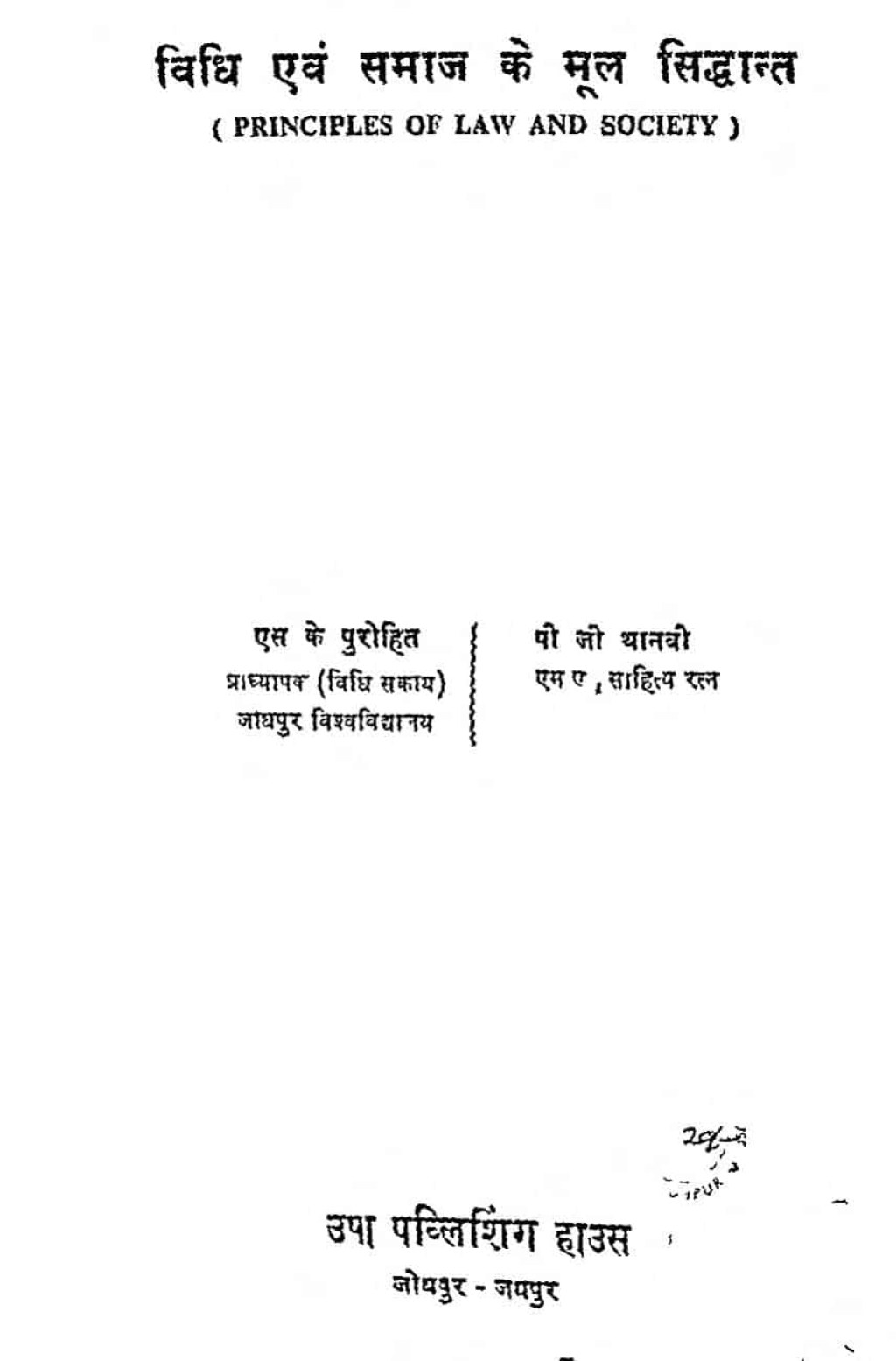Unlock The Power Of Law And Society In Hindi: Empower Your Community Today!
Law and Society in Hindi: An Overview of the Legal System in India
Dear Readers,
1 Picture Gallery: Unlock The Power Of Law And Society In Hindi: Empower Your Community Today!

Welcome to this informative article on law and society in Hindi. In this article, we will delve into the intricacies of the legal system in India and its impact on society. From the what, who, when, where, why, and how of the law in Hindi, to the advantages and disadvantages, we will explore various aspects of this topic. So, let’s get started!
Table of Contents
1. Introduction
Image Source: fbsbx.com
2. What is Law and Society in Hindi?
3. Who is Involved in the Legal System?
Image Source: fbsbx.com
4. When Did the Hindi Legal System Emerge?
5. Where is the Law Practiced in Hindi?
6. Why is Law and Society Important in Hindi?

Image Source: epustakalay.com
7. How Does the Legal System Function in Hindi?
8. Advantages of Law and Society in Hindi
9. Disadvantages of Law and Society in Hindi
10. Frequently Asked Questions
11. Conclusion
12. Final Remarks
1. Introduction
The legal system in India plays a crucial role in maintaining law and order and ensuring justice for its citizens. As India is a diverse country with multiple languages, including Hindi, it is important to have a legal system that caters to the needs of the Hindi-speaking population. The law and society in Hindi encompass various aspects of the legal system, including legislation, enforcement, and judiciary. In this section, we will provide an overview of the Hindi legal system and its significance in society.
India follows a federal system of government, where both the central government and state governments have the power to legislate and enforce laws. The legal system is primarily based on common law, which is a legal system derived from judicial decisions and precedents. The Constitution of India serves as the supreme law of the land and provides the framework for governance and the protection of citizens’ rights.
The judiciary in India is independent and plays a crucial role in interpreting and upholding the law. The Supreme Court of India is the highest judicial authority in the country and has the power of judicial review. Additionally, each state has its own High Court, which has jurisdiction over matters within its territory. The lower courts, such as district courts and subordinate courts, handle cases at the grassroots level.
Now, let’s explore the various aspects of law and society in Hindi in more detail.
2. What is Law and Society in Hindi?
The term law and society in Hindi refers to the legal system and its impact on society in the Hindi language. It encompasses the laws, rules, and regulations that govern the Hindi-speaking population and shape their interactions with the legal system. The Hindi legal system ensures that laws are accessible and understandable to Hindi-speaking individuals, promoting inclusivity and equal access to justice.
Law and society in Hindi also encompass legal education, legal aid, and awareness among the Hindi-speaking population. It aims to empower individuals with knowledge of their legal rights and responsibilities, enabling them to participate actively in society and seek redressal for any legal grievances.
3. Who is Involved in the Legal System?
The legal system in Hindi involves various stakeholders who play different roles in ensuring the administration of justice. These include:
– Judges: Judges preside over courts and make decisions based on the interpretation of law. They ensure fair and impartial proceedings and deliver justice.
– Lawyers: Lawyers represent clients in court and provide legal advice. They argue cases on behalf of their clients and present evidence to support their arguments.
– Police: The police are responsible for enforcing the law and maintaining order. They investigate crimes, apprehend suspects, and ensure public safety.
– Legislators: Legislators are responsible for creating laws. They draft, debate, and pass legislation to address societal issues and ensure the welfare of the citizens.
– Government Officials: Government officials, such as public prosecutors and legal advisors, play a vital role in the legal system. They represent the government’s interests and provide legal guidance.
– Citizens: The citizens are the most important stakeholders in the legal system. They have rights and responsibilities and can seek legal recourse for any infringements or disputes.
4. When Did the Hindi Legal System Emerge?
The Hindi legal system has its roots in ancient India, where the concept of justice was intrinsic to society. The ancient legal system in India, known as Dharma, emphasized fairness, equality, and justice. Legal texts such as the Manusmriti and Arthashastra provided guidelines for governance and administration of justice.
Over the centuries, various rulers and dynasties introduced their legal systems, influenced by Hindu, Islamic, and British laws. The British Raj significantly impacted the Indian legal system and introduced the common law system, which forms the basis of the present legal system in India.
5. Where is the Law Practiced in Hindi?
The law is practiced in Hindi in various courts and legal institutions across the country. Hindi is one of the official languages of India and is widely spoken and understood by a large section of the population. The Supreme Court of India, High Courts, and subordinate courts conduct proceedings in Hindi, along with English. Legal documents and judgments are also available in Hindi, ensuring accessibility for Hindi-speaking individuals.
Additionally, law colleges and universities in India offer legal education in Hindi, allowing aspiring lawyers to study and practice law in their native language.
6. Why is Law and Society Important in Hindi?
Law and society in Hindi are of utmost importance as they ensure that laws are accessible and understandable to the Hindi-speaking population. It promotes inclusivity, equal access to justice, and empowers individuals with legal knowledge. The Hindi legal system plays a vital role in maintaining law and order, resolving disputes, and upholding the rights and freedoms of citizens.
By providing legal education and awareness in Hindi, the legal system enables individuals to understand their rights, seek legal remedies, and actively participate in society. It ensures that the Hindi-speaking population has a voice in the legal system and is not disadvantaged due to language barriers.
7. How Does the Legal System Function in Hindi?
The legal system in Hindi functions through legislation, enforcement, and judiciary. Legislation involves the creation of laws by the legislature, which includes the Parliament at the central level and state legislatures at the state level. These laws are enacted to govern various aspects of society, such as criminal offenses, civil disputes, property rights, and human rights.
Enforcement of laws is carried out by the police and other law enforcement agencies. They investigate crimes, gather evidence, and apprehend offenders. The enforcement agencies work in collaboration with the judiciary to ensure justice is served.
The judiciary, comprising the Supreme Court, High Courts, and subordinate courts, interprets the laws and resolves disputes. The courts hear cases, examine evidence, listen to arguments from lawyers, and deliver judgments. The judiciary ensures that the laws are applied fairly and impartially, providing justice to all.
8. Advantages of Law and Society in Hindi
The law and society in Hindi offer several advantages:
1. Accessibility: By providing legal information and resources in Hindi, the legal system becomes accessible to a larger section of the population.
2. Inclusivity: It promotes inclusivity by ensuring that Hindi-speaking individuals can understand and participate in legal proceedings.
3. Empowerment: By imparting legal knowledge in Hindi, individuals are empowered to assert their rights and seek justice.
4. Preservation of Culture: Law and society in Hindi help preserve the cultural identity and heritage of Hindi-speaking communities.
5. Strengthening Democracy: A robust legal system in Hindi strengthens the democratic fabric of the country and ensures the rule of law.
9. Disadvantages of Law and Society in Hindi
Despite its advantages, law and society in Hindi also have some disadvantages:
1. Language Barrier: Restricting legal proceedings to Hindi may create a language barrier for non-Hindi speakers, leading to exclusion and difficulties in accessing justice.
2. Limited Resources: The availability of legal resources, such as books, judgments, and legal literature, in Hindi may be limited compared to English.
3. Regional Differences: India is a diverse country with multiple languages. Limiting legal proceedings to Hindi may not cater to the linguistic needs of all citizens.
4. Translation Challenges: Translating legal concepts and terminology from English to Hindi accurately may pose challenges and impact the clarity and effectiveness of legal communication.
5. Standardization: Ensuring uniformity and standardization of legal terminology and language in Hindi across different states and regions may be challenging.
10. Frequently Asked Questions
Q1. Is Hindi the only language used in the Indian legal system?
A1. No, Hindi is one of the official languages used in the Indian legal system. English is also widely used, especially in higher courts and legal documentation.
Q2. Can non-Hindi speakers access legal services in India?
A2. Yes, legal services are available in multiple languages across India. However, knowledge of the local language or English may be advantageous.
Q3. Are there any efforts to promote legal education in Hindi?
A3. Yes, several universities and law colleges in India offer legal education in Hindi, promoting legal studies in the Hindi language.
Q4. How are judgments delivered in Hindi courts?
A4. Judgments are delivered orally in open court by the judges. They are later transcribed and made available in written form in Hindi.
Q5. Can I file a legal case in Hindi?
A5. Yes, legal cases can be filed in Hindi, provided the court has jurisdiction and accepts filings in Hindi.
11. Conclusion
In conclusion, law and society in Hindi play a significant role in India’s legal system. It ensures the accessibility and inclusivity of the legal system for the Hindi-speaking population, empowering individuals with legal knowledge and promoting equal access to justice. While there are certain advantages and disadvantages to the Hindi legal system, efforts are being made to address the challenges and ensure a robust legal framework in Hindi.
By promoting legal education, awareness, and resources in Hindi, India strives to strengthen its legal system and uphold the rights and liberties of its citizens.
12. Final Remarks
In this article, we have explored various aspects of law and society in Hindi, shedding light on the legal system in India and its impact on society. It is important to remember that the legal system is dynamic and constantly evolving to meet the needs of a diverse and multicultural society.
While we have provided comprehensive information, it is always advisable to consult legal professionals or refer to official sources for specific legal advice or information. By staying informed and aware, we can actively participate in the legal system and contribute to a just and equitable society.
This post topic: Law and Society
